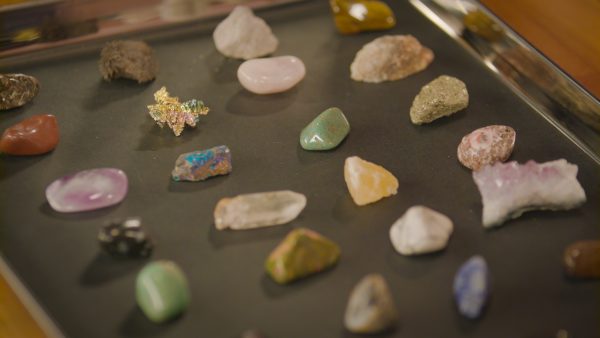Igneous Rock Definition
Igneous rock forms from cooled magma or lava. For example, lava cools quickly above the surface to form igneous rock.
View Lesson on Rocks & Minerals (Including Rock Cycle)
Become a member to get full access to our entire library of learning videos, reading material, quiz games, simple DIY activities & more.
Become a member to get full access to our entire library of learning videos, quiz games, & more.
Plans & Pricingto watch this full video.

Access All Videos
and Lessons, No Limits.
Access All Videos

No credit card required,
takes 7 sec to signup.
No card required

Ready-to-go lessons
that save you time.
Ready-to-go lessons
If you are on a school computer or network, ask your tech person to whitelist these URLs:
*.wistia.com, fast.wistia.com, fast.wistia.net, embedwistia-a.akamaihd.net
Sometimes a simple refresh solves this issue. If you need further help, contact us.
Rocks & Minerals (Including Rock Cycle)
Fun Facts
- Obsidian forms when lava cools down fast.
- Igneous rocks form by liquid magma cooling near Earth's surface.
- Igneous rock breaks apart over thousands of years to form sediment.
Why Do We Need To Know About Igneous Rock
Learning about igneous rocks helps us see how they’re used in many ways and why they’re important for different jobs. For example, gabbro is used to make roads and granite is used in buildings, showing how these rocks help in making things we use every day. Also, people a long time ago used obsidian, another type of igneous rock, to make sharp tools and weapons.
These rocks are also important in new technology and exploring space. Quartz, a mineral from igneous rocks, is used in electronics because it can keep time when powered. Studying igneous rocks on Earth and other planets like Mars shows how geology, the study of rocks, is not just about the past but also about finding new things in space.
Frequently Asked Questions
Check out the Full Lesson on Rocks & Minerals (Including Rock Cycle)
In this lesson, we learn that:
- A mineral is a natural solid with a characteristic crystal shape.
- Rocks are made of mineral pieces mixed together.
- Rocks form, break down and move through the rock cycle.
Related Topics
- Analog Signal Definition
- Bacteria Definition
- Biochemistry Definition
- Biomimicry Definition
- Cast Fossils Definition
- Competition Definition
- Earth’s Rotation Definition
- Ecosphere Definition
- Electric Field Definition
- Electricity Definition
- Engineering Design Process Definition
- Erosion Definition
- Food Chain Definition
- Germination Definition
- Group Behavior Definition
- Heat Definition
- Humidity Definition
- Igneous Rock Definition
- Inherited Traits Definition
- Keystone Species Definition
- Liquid Nitrogen Definition
- Magma Definition
- Matter Definition
- Mineral Definition
- Moon Definition
- Natural Disaster Definition
- Natural Selection Definition
- Non-renewable Resource Definition
- Prey Definition
- Problem Definition
- Reactants Definition
- Respiratory System Definition
- Rock Definition
- Salt Water Definition
- Sedimentary Rock Definition
- Seed Definition
- Snow Definition
- Soil Erosion Definition
- Sun Definition
- Surface Runoff Definition
- Thermal Energy Definition
- Translucent Definition
- Unbalanced Force Definition
- Vibrating Definition
- Volts Definition
- Water Quality Definition
- Watershed Definition
- Wedge Definition


Start a Free Trial Today. Get a $5 Amazon Gift Card!
Teachers! Start a free trial & we'll send your gift card within 1 day. Only cards left. Try it now.
Select Grade
Select Subject
This email is associated with a Science Kit subscription. Kit subscriptions are managed on this separate page: Manage Subscription

-
Download InvoiceScience & Math$/yr
-
Download InvoiceScience Only$/yr

access all lessons
• No credit card required •
"My students loved the videos. I started the video subscription in May and used them as a review before the state test, which I know contributed to 100% of my class passing the state test."
Rhonda Fox 4th Grade Teacher, Ocala, Florida
Use Generation Genius in Your School
Access all lessons free for 30 days.
"My students loved the videos. I started the video subscription in May and used them as a review before the state test, which I know contributed to 100% of my class passing the state test."
Rhonda Fox 4th Grade Teacher, Ocala, Florida
• No credit card required •
Already a member? Sign In
* no credit card required *

* no credit card required *
* no credit card required *

Get District Quote
Discounts start at 3 schools.
Sent!
Thank you for your inquiry.
We will email you a quote as soon as we can.

to Discover the Benefits of Generation Genius
Learn How to Save for Your School & District!
Please login or create an account to access additional resources

no credit card required
Skip, I will use a 3 day free trial
Enjoy your free 30 days trial
-
Unlimited access to our full library
of videos & lessons for grades K-5. -
You won’t be billed unless you keep your
account open past your 14-day free trial. -
You can cancel anytime in 1 click on the
manage account page or by emailing us.
-
Unlimited access to our full library of videos & lessons for grades K-5.
-
You won't be billed unless you keep your account open past 14 days.
-
You can cancel anytime in 1-click on the manage account page.
Cancel anytime in 1-click on the manage account page before the trial ends and you won't be charged.
Otherwise you will pay just $10 CAD/month for the service as long as your account is open.
Cancel anytime on the manage account page in 1-click and you won't be charged.
Otherwise you will pay $10 CAD/month for the service as long as your account is open.
We just sent you a confirmation email. Enjoy!
Done



























































































































 GENERATION GENIUS
GENERATION GENIUS